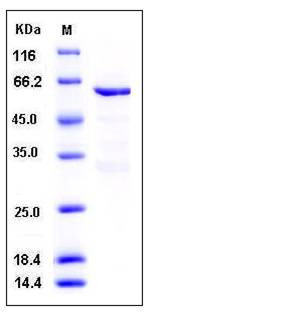Human MUSK Kinase Protein (aa 433-783, His & GST Tag)
RP11-104M22.1, MGC126323, MGC126324
- 100ug (NPP4097) Please inquiry
| Catalog Number | P11918-H20B |
|---|---|
| Organism Species | Human |
| Host | Baculovirus-Insect Cells |
| Synonyms | RP11-104M22.1, MGC126323, MGC126324 |
| Molecular Weight | The recombinant human MUSK (aa 433-783)/GST chimera consists of 588 amino acids and has a calculated molecular mass of 68 kDa. It migrates as an approximately 58 kDa band in SDS-PAGE under reducing conditions. |
| predicted N | Met |
| SDS-PAGE |  |
| Purity | > 90 % as determined by SDS-PAGE |
| Protein Construction | A DNA sequence encoding the C-terminal segment of human MUSK isoform 2 (O15146-2) (Arg 433-Val 783) was fused with the N-terminal polyhistidine-tagged GST tag at the N-terminus. |
| Bio-activity | Kinase activity untested |
| Research Area | Immunology |Signal Transduction |Signaling Pathway |Representative pathway |Wnt Signaling pathway |Wnt Receptors | |
| Formulation | Supplied as sterile 20mM Tris, 500mM NaCl, pH 7.4, 10mM GSH 1. Normally 5 % - 8 % trehalose and mannitol are added as protectants before lyophilization. Specific concentrations are included in the hardcopy of COA. |
| Background | Muscle, skeletal receptor tyrosine-protein kinase, also known as Muscle-specific tyrosine-protein kinase receptor, Muscle-specific kinase receptor, and MUSK, is a single-pass type I membrane protein which belongs to the protein kinase superfamily and tyr protein kinase family. MUSK contains one FZ (frizzled) domain, three Ig-like C2-type (immunoglobulin-like) domains and one protein kinase domain. This protein is a muscle-specific tyrosine kinase receptor and it may play a role in clustering of the acetylcholine receptor in the postsynaptic neuromuscular junction. MUSK expression is increased in muscle cells stimulated with Wnt or at conditions when the Wnt signaling was activated. MUSK is a muscle-specific receptor tyrosine kinase that is activated by agrin. It has a critical role in neuromuscular synapse formation. MUSK is a receptor tyrosine kinase that is a key mediator of agrin's action and is involved in neuromuscular junction (NMJ) organization. Defects in MUSK encoding gene is a cause of autosomal recessive congenital myasthenic syndrome (CMS). Congenital myasthenic syndromes are inherited disorders of neuromuscular transmission that stem from mutations in presynaptic, synaptic, or postsynaptic proteins. MUSK mutations lead to decreased agrin-dependent AChR aggregation, a critical step in the formation of the neuromuscular junction. Mutations in this receptor encoding gene also have been associated with congenital myasthenic syndrome. |
| Reference |
